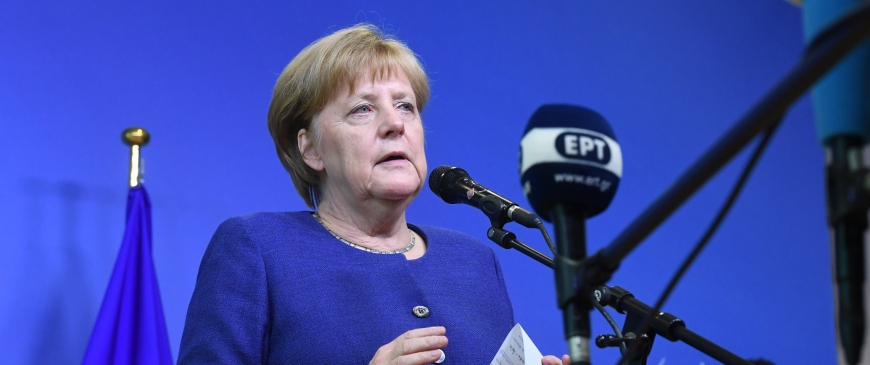
Angela Merkel will not get to pass the crown to her preferred successor without a fight
German Chancellor Merkel announced today that she would not run again for the leadership of her conservative CDU/CSU party. The end of Merkel’s chancellorship is in sight. Her priority now is to manage the transition and install one of her allies as the next party head and potential chancellor, but her critics are unlikely to concede to that without a fight. Which path Merkel and the CDU/CSU decide to go down depends on what they identify as the route of the problem: is it policies or personnel?
In response to declining popularity in national polls and an erosion of her authority in Berlin, the pressure had been mounting on Merkel to relinquish the party leadership. Her withdrawal comes on the back of a historical defeat in regional elections in the state of Hesse on Sunday where the CDU with 27 per cent of the votes had its weakest performance in more than fifty years. Her party, even her critics, held on to Merkel for years because she was winning elections for them. These days now appear to be over.
Three potential scenarios for the future of the CDU, and with that for German politics, arise. Firstly, Merkel succeeds in installing one of her allies as party leader at the forthcoming party congress in December, who is destined to become the next CDU candidate for chancellor. She wants it to be either the current secretary general Annegret Kramp-Karrenbauer or the current Minister-President of North Rhine-Westphalia, Armin Laschet.
In substance and style, both closely resemble Merkel and would keep the CDU on Merkel’s centrist path. But Merkel was able to hold course for so long only because of her unique experience and standing – it is questionable if a “second Merkel” with less experience would be able to unite the conservatives.
Secondly, former finance minister Wolfgang Schäuble could depose Merkel and form a new government himself. Speculations over his ambitions have been ripe in recent weeks. He has openly commented on Merkel’s weakness and predicted that the regional elections might bring about ‘great changes’ within the CDU. Schäuble is widely popular with both wings of the conservative party and could take over the government as caretaker (he is 76), before making space for a younger candidate in a couple of years. He would have to negotiate an agreement with the Social Democrats (SPD), the conservatives’ current coalition partner. But after the pummeling the SPD has taken in both Bavaria and Hesse, party leadership in Berlin will want to avoid new elections and might be satisfied with a formal return to the already negotiated coalition treaty,
Thirdly, the conservative wing of the party pushes through one of their candidates, which would signify a break with the Merkel era. For years, they have been discontent with Merkel’s relatively liberal policies, from the minimum wage and gay marriage to her approach in the refugee crisis. The current health minister and outspoken Merkel critic, Jens Spahn (he is 38), is considered the conservatives’ favourite, but the CDU crisis might have come too early for him. In a surprise move, however, former CDU chief whip Friedrich Merz is rumoured to prepare a bid for power, supported by Germany's biggest tabloid BILD.
Merkel’s refugee policies have been unpopular with some, and the far-right Alternative for Germany (AfD) entered the parliament in Hesse for the first time with 13 per cent. But a sharp right turn in response to their bad results might be too simple a solution for the conservatives - the CDU’s sister party CSU in Bavaria,lost dramatically after campaigning on an anti-Merkel, anti-immigration platform. At the same time, the immigration-friendly Green party, continued its recent electoral successes in Hesse, gaining almost 20 per cent of the vote. The party faithful might be content with a change in personnel while staying on a broadly centrist course. Even if she is deposed, Merkel would thus have her last victory.
In the big picture, however, the developments in German politics confirm the rise in support for smaller parties at the expense of the big-tent parties, as the political landscape is becoming more fragmented and polarised. That also means that Berlin will remain inward-looking for the foreseeable future – bad news for Europe.
Sophia Besch is research fellow at the Centre for European Reform. Leonard Schuette is the Clara Marina O'Donnell fellow at the Centre for European Reform (2018-19).
